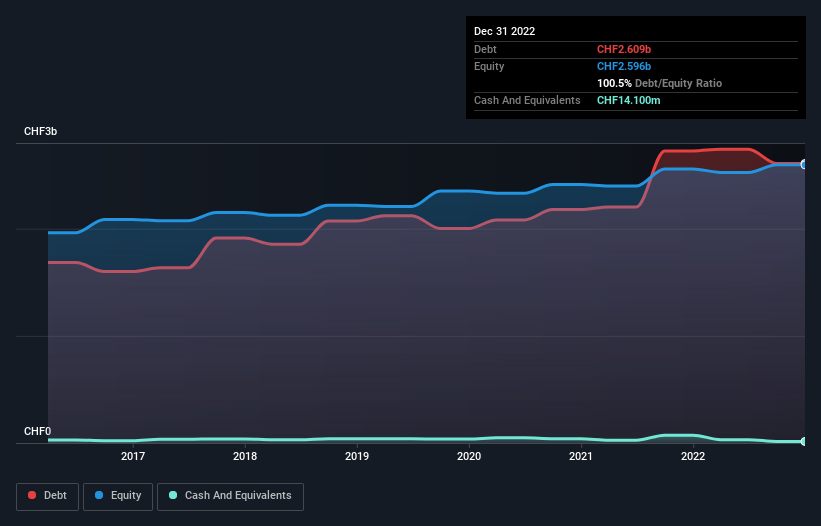Some say volatility, rather than debt, is the best way to think about risk as an investor, but Warren Buffett famously said that 'Volatility is far from synonymous with risk.' So it seems the smart money knows that debt - which is usually involved in bankruptcies - is a very important factor, when you assess how risky a company is. We can see that Allreal Holding AG (VTX:ALLN) does use debt in its business. But the more important question is: how much risk is that debt creating?
When Is Debt Dangerous?
Debt assists a business until the business has trouble paying it off, either with new capital or with free cash flow. Part and parcel of capitalism is the process of 'creative destruction' where failed businesses are mercilessly liquidated by their bankers. However, a more common (but still painful) scenario is that it has to raise new equity capital at a low price, thus permanently diluting shareholders. Having said that, the most common situation is where a company manages its debt reasonably well - and to its own advantage. The first thing to do when considering how much debt a business uses is to look at its cash and debt together.
View our latest analysis for Allreal Holding
How Much Debt Does Allreal Holding Carry?
You can click the graphic below for the historical numbers, but it shows that Allreal Holding had CHF2.61b of debt in December 2022, down from CHF2.73b, one year before. And it doesn't have much cash, so its net debt is about the same.

A Look At Allreal Holding's Liabilities
The latest balance sheet data shows that Allreal Holding had liabilities of CHF1.08b due within a year, and liabilities of CHF2.02b falling due after that. Offsetting these obligations, it had cash of CHF14.1m as well as receivables valued at CHF43.7m due within 12 months. So it has liabilities totalling CHF3.04b more than its cash and near-term receivables, combined.
When you consider that this deficiency exceeds the company's CHF2.49b market capitalization, you might well be inclined to review the balance sheet intently. Hypothetically, extremely heavy dilution would be required if the company were forced to pay down its liabilities by raising capital at the current share price.
We measure a company's debt load relative to its earnings power by looking at its net debt divided by its earnings before interest, tax, depreciation, and amortization (EBITDA) and by calculating how easily its earnings before interest and tax (EBIT) cover its interest expense (interest cover). This way, we consider both the absolute quantum of the debt, as well as the interest rates paid on it.
As it happens Allreal Holding has a fairly concerning net debt to EBITDA ratio of 14.0 but very strong interest coverage of 11.0. This means that unless the company has access to very cheap debt, that interest expense will likely grow in the future. Notably Allreal Holding's EBIT was pretty flat over the last year. Ideally it can diminish its debt load by kick-starting earnings growth. There's no doubt that we learn most about debt from the balance sheet. But ultimately the future profitability of the business will decide if Allreal Holding can strengthen its balance sheet over time. So if you're focused on the future you can check out this free report showing analyst profit forecasts.
But our final consideration is also important, because a company cannot pay debt with paper profits; it needs cold hard cash. So we always check how much of that EBIT is translated into free cash flow. During the last three years, Allreal Holding produced sturdy free cash flow equating to 71% of its EBIT, about what we'd expect. This cold hard cash means it can reduce its debt when it wants to.
Our View
Allreal Holding's net debt to EBITDA was a real negative on this analysis, although the other factors we considered cast it in a significantly better light. In particular, its interest cover was re-invigorating. When we consider all the factors discussed, it seems to us that Allreal Holding is taking some risks with its use of debt. While that debt can boost returns, we think the company has enough leverage now. When analysing debt levels, the balance sheet is the obvious place to start. But ultimately, every company can contain risks that exist outside of the balance sheet. Be aware that Allreal Holding is showing 2 warning signs in our investment analysis , you should know about...
If you're interested in investing in businesses that can grow profits without the burden of debt, then check out this free list of growing businesses that have net cash on the balance sheet.
New: Manage All Your Stock Portfolios in One Place
We've created the ultimate portfolio companion for stock investors, and it's free.
• Connect an unlimited number of Portfolios and see your total in one currency
• Be alerted to new Warning Signs or Risks via email or mobile
• Track the Fair Value of your stocks
Have feedback on this article? Concerned about the content? Get in touch with us directly. Alternatively, email editorial-team (at) simplywallst.com.
This article by Simply Wall St is general in nature. We provide commentary based on historical data and analyst forecasts only using an unbiased methodology and our articles are not intended to be financial advice. It does not constitute a recommendation to buy or sell any stock, and does not take account of your objectives, or your financial situation. We aim to bring you long-term focused analysis driven by fundamental data. Note that our analysis may not factor in the latest price-sensitive company announcements or qualitative material. Simply Wall St has no position in any stocks mentioned.
About SWX:ALLN
Allreal Holding
Through its subsidiaries, engages in real estate business in Switzerland.
Average dividend payer with slight risk.
Similar Companies
Market Insights
Community Narratives



